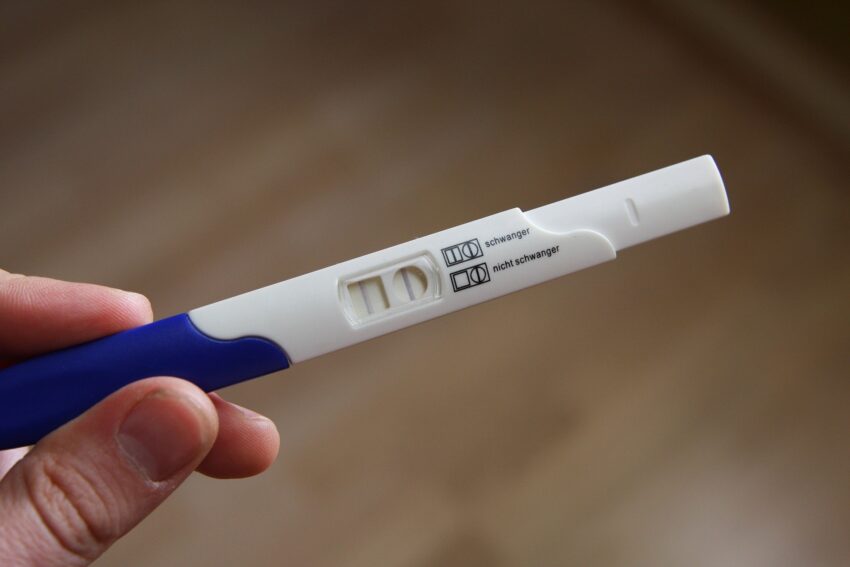7 Tips to Get Pregnant Fast

This post may contain affiliate links which means I may receive a commission for purchases made through links. I will only recommend products that I have personally used! Learn more on my Private Policy page.
Are you trying to conceive this year? Or maybe you’re just thinking about thinking about it? Perhaps you have been trying for a few months, and need some tips! Read on my friend- here are some tips to help you conceive.
1. Know when you’re ovulating
With pregnancy, timing is everything. You can only get pregnant during a very small window each month, depending on ovulation. Ovulation is different for every woman but usually happens about days 9-15 of the menstrual cycle.
How to calculate: the first day of your period is day 1 of your cycle. So about day 9 of the cycle is when you become “fertile”.
Some women use ovulation trackers to help them know the exact day of ovulation. If you time things right and have sex on the day of ovulation you will have increased success in achieving pregnancy.
Ovulation predictor kits are sold in many places, including Walmart, Target, Amazon, and any pharmacy. If you have somewhat irregular periods tracking ovulation may be a good place for you to start.
To read more about understanding ovulation, check out this post for more!
2. Have sex!
This one should seem obvious, but the most important thing when trying to conceive is to be sure you are doing it at the right time, and not too frequently.
During the most fertile time of your cycle, around days 9-15, you should try to have sex only every other day. Sperm counts are lower and less viable when you are having sex too frequently. Remember, sperm are viable for about 72 hours after sex, which means you don’t need to be having constant sex to be getting pregnant.
3. Take a Prenatal Vitamin
Now, this won’t necessarily increase your odds of pregnancy, but when you are trying to conceive you should take a prenatal vitamin with at least 800 mcg of folic acid for 3 months before trying to conceive, and for the first 3 months of pregnancy at least. This is important to prevent neural tube defects such as spina bífida in the baby.
For a list of my favorite prenatal vitamins, check out this post about my favorite prenatals!
4. Use a sperm-safe lubricant
This matters more than you may think! Some lubricants can be harmful to sperm, thus decreasing your chances of conceiving. Also, many lubricants can be irritating to the vagina, change your vaginal pH, and cause vaginal infections. Not good!
My favorite lube that provides a good environment for conception is pre-seed. You can use it as directed, or just use it like you would a normal lubricant before getting started, and the sperm will have more success in making it to the target destination.
5. Eat well and exercise
Healthy habits are crucial in all aspects of health, but in fertility especially. Avoid junk foods, sodas, and processed foods. Make sure you are eating plenty of fruits and vegetables.
Exercise is great for women before and during pregnancy. Exercises such as yoga, walking, or jogging are good. At least 30 minutes 5 days a week.
6. Don’t stress
Trying to conceive can be a very emotional time! Remember, enjoy your time with your partner or spouse. Don’t make baby-making into a chore- keep it fun! I know we all want to plan out our lives, and plan to have our baby in the Fall or Spring because of X reason, but don’t get caught in the trap of being down if it doesn’t happen when you want it to. Make sure your sex life is still fun and pleasurable and doesn’t become a burden. Stress less, and have fun with it! Sometimes it can take several months when trying to conceive, so don’t worry if it’s not happening during the first few months.
7. Still not getting pregnant? See your doctor
A lot of doctors will recommend trying for 1 year, or 6 months if you are over 35 before returning for fertility testing because honestly, it can take some time. Most women will achieve pregnancy spontaneously in the first 12 months of trying. However, if you are not pregnant after about 6 months, and you are still worried, see your doctor! They can do lab work to make sure your hormone levels are where they should be, and that you are ovulating correctly. Sometimes it’s the husband or partner that may be having suboptimal sperm, and sperm studies are also a good idea to see if there may be some male infertility issues.
In my case, we started seeing our doctor after we had been trying for 6 months and did lab work that was all normal. At 1 year my husband had a semen analysis, and after a few failed interventions with my OB, we started seeing a fertility specialist at 18 months.
For more information about our fertility journey, read more here.
I wish you all the luck in your search for your baby! If you have been trying to conceive for some time, or have comments or questions, reach out through our contact page! Good luck to you my friend!



